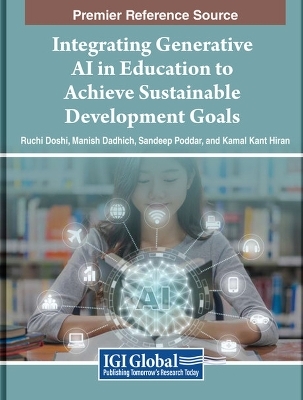
Integrating Generative AI in Education to Achieve Sustainable Development Goals
IGI Global (Verlag)
979-8-3693-2440-0 (ISBN)
A new challenge has become present in the field of generative artificial intelligence (AI). The fundamental nature of education, a vital element for advancing the United Nations' Sustainable Development Goals (SDGs), now grapples with the transformative impact of AI technologies. As we stand at this intersection of progress and pedagogy, critical questions surface about the future roles of educators and the integrity of assessment processes. AI's rapid progression prompts an exploration of the competencies our education systems must cultivate in a world where human and machine intelligence are becoming increasingly interconnected. Against this backdrop of transformative uncertainty, Integrating Generative AI in Education to Achieve Sustainable Development Goals addresses profound challenges and offers promising solutions at the crossroads of AI and education. This book assembles distinguished academics, researchers, and practitioners, forming a collective voice on the intersection of Generative AI and education. The three-part structure dissects the technical aspects of AI-powered innovations in educational design, explores multidisciplinary applications enhancing educational content, and highlights AI-driven solutions to address equality and inclusion concerns within educational systems. The book also underscores the importance of ethical considerations of generative AI to ensure a future where technology serves the broader goals of sustainability and equitable education. This book's primary objective is to serve as a resource for academicians, independent researchers, research scholars, students, scientists, libraries, and industry experts. Through a diverse range of topics, it investigates how generative AI can advance Sustainable Development Goals, making education more accessible, individualized, and effective. By harnessing the power of AI, the book argues, education can act as a catalyst for positive change, empowering individuals and fostering progress toward a sustainable and equitable future. The recommended topics within each part provide a structured framework for deepening the understanding of Generative AI's role in shaping the future of education, making this book a valuable reference for scholars and practitioners alike.
Ruchi Doshi has more than 16 years of academic, research and software development experience in Asia and Africa. Currently she is working as research supervisor at the Azteca University, Mexico and Adjunct Professor at the Jyoti Vidyapeeth Women's University, Jaipur, Rajasthan, India. She worked in the BlueCrest University College, Liberia, West Africa as Registrar and Head, Examination; BlueCrest University College, Ghana, Africa; Amity University, Rajasthan, India; Trimax IT Infrastructure & Services, Udaipur, India. She worked as a Founder Chair, Women in Engineering (WIE) and Secretary Position in the IEEE Liberia Subsection. She worked with Ministry of Higher Education (MoHE) in Liberia and Ghana for the Degree approvals and accreditations processes. She is interested in the field of Machine Learning and Cloud computing framework development. She has published numerous research papers in peer-reviewed international journals and conferences. She is a Reviewer, Advisor, Ambassador and Editorial board member of various reputed International Journals and Conferences. Manish Dadhich is an associate professor that works at Sir Padampat Singhania University, India. Sandeep Poddar, Deputy Vice Chancellor (Research & Innovation), Member of Board of Studies, Lincoln University College, Malaysia, has been graduated from University of Calcutta in 1993 with Honours in Zoology, he has obtained Post Graduate Diploma in Dietetics from All India Institute of Hygiene and Public Health 1995, Master of Science in Zoology with specialization in Biochemical Genetics from Dayalbagh Educational Institute 1998 with distinction. He has completed PhD in Zoology from Vivekananda Institute of Medical Sciences on Cytotoxicity in 2004. After completing PhD he pursued Post Doctoral Research in different projects on Hemoglobinopathies and Oral Cancer mutation. Dr Sandeep completed his MBA from Lincoln University College, Malaysia. He has published several research papers, filed patent and organized international conferences, and also edited books in Malaysia, Australia and India. Dr Sandeep is Fellow member of World Researchers Associations and Life members of Different associations including Indian Science Congress Association. Dr Sandeep is founder Assistant Secretary of Dr Tarak Nath Podder Memorial Foundation, Kolkata, India Kamal Hiran has over 18 years of experience in academia, research, and administration in Asia, Africa, Europe, and North America. Currently he is working as Associate Professor in the School of Computer Science and IT, Symbiosis University of Applied Sciences, Indore, India and Adjunct Research Fellow at the Aalborg University, Copenhagen, Denmark. He has published 15 International books with repute publishers like BPB Publications, IGI Global, De Gruyter from India, Germany, USA, UK. He has made significant contributions to our society's technological transformation. He has several awards to his credit such as International travel grant for attending the IEEE Region 8 Committee Meeting at Warsaw, Poland; International travel grant for Germany from ITS Europe, Passau, Germany; Best Research Paper Award at the University of Gondar, Ethiopia; IEEE Liberia Subsection Founder Award; Gold Medal Award in MTech (Hons.); IEEE Ghana Section Award-Technical and Professional Activity Chair; IEEE Senior Member Recognition, Best IEEE Student Branch Award, Elsevier Reviewer Recognition Award. He has published 75 scientific research papers in SCI/Scopus/Web of Science and IEEE Transactions Journal, conferences, 2 Indian Patents, 1 Australian Patent Grants. He has made several international visits to Denmark, Sweden, Germany, Norway, Ghana, Liberia, Ethiopia, Russia, Dubai, Mexico, and Jordan for research exposures. His research interests focus on Artificial Intelligence, Cloud-edge computing, Machine-deep learning and Intelligent IoT.
| Erscheinungsdatum | 04.06.2024 |
|---|---|
| Verlagsort | Hershey |
| Sprache | englisch |
| Maße | 216 x 279 mm |
| Gewicht | 272 g |
| Themenwelt | Schulbuch / Wörterbuch ► Unterrichtsvorbereitung ► Unterrichts-Handreichungen |
| Informatik ► Theorie / Studium ► Künstliche Intelligenz / Robotik | |
| Sozialwissenschaften ► Pädagogik | |
| Wirtschaft ► Betriebswirtschaft / Management | |
| Wirtschaft ► Volkswirtschaftslehre | |
| ISBN-13 | 979-8-3693-2440-0 / 9798369324400 |
| Zustand | Neuware |
| Haben Sie eine Frage zum Produkt? |
aus dem Bereich


